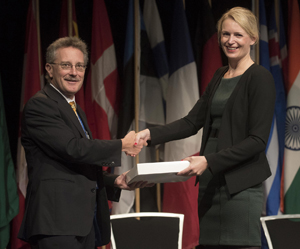Author: Ruth Klinkhammer, CMC Communications Director
Most everyone involved in carbon capture and storage (CCS) agrees communication and engagement with the public is critical to moving projects and the technology forward. So it was great to see that, as in years past, a stream of communication and engagement sessions was scheduled at the recent GHGT-12 conference in Austin, TX (Oct. 5-9, 2014).
Although there was one panel on engagement earlier in the week, the bulk of the engagement sessions took place on Thursday, Oct. 9 beginning with a plenary talk by Dr. Emma ter Mors, a senior researcher at Leiden University, who focused on issues of trust and community compensation within engagement processes.
Mors noted that trust impacts acceptance within an audience – both in terms of perceived risks and perceived benefits of a project. It follows then, the industry stakeholders should think about teaming up with a trusted party. Mors added that surveys show the public tends to trust ENGOs and scientists.
But having a trusted speaker will not guarantee acceptance of a project – messaging counts too. Publics ascribe motives to stakeholders and they tend to discount or disbelieve messages that run counter to those pre-assigned motives. A company that says it is engaging in CCS for environmental reasons will not be believed if the public thinks the real motivation is based on economics.
Community compensation
Mors also spoke extensively about the vagaries of compensating communities hosting CCS projects. Financial compensation is a not a silver bullet, partly because companies often misjudge what is valuable to residents. Community concerns often revolve around issues of health and safety which are “sacred” values. Offering monetary compensation, a “secular” value, as a trade-off for a sacred value will be seen as unreasonable and offensive. (Even worse, it could lead to absolute outrage.) As a best practice, developers should find out the kinds of values a community believes are threatened and ensure compensation is commensurate with the perceived risks.
Her reflection on communities and compensation reminded me of a Tuesday panel discussion on Ethical considerations for CCS deployment in developing countries. Among the panelists was Polly Modiko, from the South African Centre for CCS, who faces the challenge of trying to educate communities that are often desperately poor and illiterate.
Ethical issues numerous
Discussion turned to the ethics of compensating communities near CCS projects. Is it ethical, someone asked, to offer electricity to a poor community that has no power in order to gain acceptance of the project? You would, of course, be doing a good for the community. On the other hand, what are the ethics of offering electricity to a community that would say yes to any kind of project or development in order to improve its standard of living? These are difficult issues with no easy solutions.
In closing the session on Ethical considerations, Stanford’s Dr. Mark Budolfson remarked that the panel discussion highlighted just how many ethical issues there are in the deployment of CCS.
And so there are – ethical issues, communication issues, engagement issues – all of which deserve attention and careful consideration by project communicators and technical experts. To ignore them is to risk the project. Perhaps Kalev H. Leetaru, of Georgetown University, said it best in the Communication & Attitudes Towards CCS session when he noted “energy projects live and die on public perception.”
